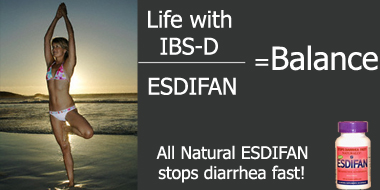Irritable Bowel Syndrome doesn't have to hold you hostage. This website is designed to help IBS sufferers live healthy & normal lives while keeping their IBS in check.
/ www.IBSREMEDY.net
What is IBS? |
|
Irritable Bowel Syndrome, or IBS, is an intestinal disorder. The disorder consists of a collection of chronic symptoms that include cramping, abdominal pain, bloating, diarrhea and constipation. These symptoms are unpredictable and range in severity from mild inconvenience to severe debilitation. IBS symptoms are also chronic, meaning that they can last for a rather long period of time when they do show up. IBS, or "spastic colon" as it is called in some circles, does not cause long term damage to the digestive system. Doctors have been unable to find the root cause of IBS despite over 200 years of research. The medical community has agreed that the condition is genetic although they still have not found the gene. IBS is as much today as it was 200 years ago, the medical mystery. IBS is diagnosed through a process of elimination. Doctors must first rule out a litany of conditions including; Crohn's disease, Ulcerative colitis, Celiac disease, fever and malnutrition to name a few. Once all the other possible conditions are ruled,out, IBS is usually diagnosed. There are no specific markers of this condition and there is no cure. People who have IBS learn the best ways to manage their condition to allow them a full and eventful life. |
Irritable Bowel Syndrome (IBS): triggers |
|
There is no cure for IBS, only management of the symptoms. Symptoms are largely managed by reducing the exposure to the "triggers" that set off IBS episodes. IBS triggers range broadly and include; diet choices, stress levels, prescription & over the counter drugs, menstruation and even the speed in which one eats. By identifying and reducing exposure to these triggers, people with IBS can significantly reduce their chances of experiencing flare-ups and episodes. DietStressMedication |
Natural supplements for IBS symptoms |
|
Sometimes you can help your IBS symtoms without having to
resort to heavy medication. There are some natural ways to treat
the symptoms, depending on the severity on the condition. |
 |
|
Quck facts about IBS |
|
|
10-15% of the US population suffers from IBS |
|
|
IBS has no cure, only treatment of the symptoms |
|
|
IBS treatments are not universal. |
|
|
20-40% of gastroenterologist visits are because of IBS |
|
What exercises should I do? |
|
 |
|
Keys to exercising for people with IBS |
|
|
1. Don't eat meals before exercising, only small snacks |
|
|
2. Choose a low impact exercise (yoga, pilates) |
|
|
3. Know where a bathroom is at all times |
|
|
4. Clear your mind of distraction to optimized relaxation |
|
|
5. Time your workout sessions to times when intestines are least active |
|
Lastest IBS News and Updates |
|
|



